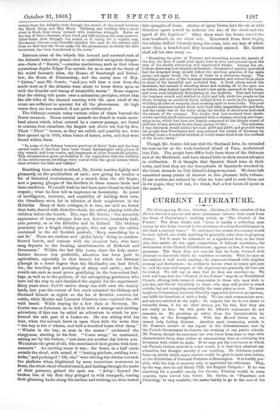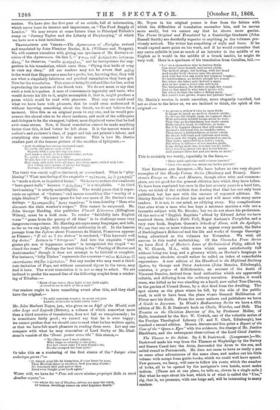CURRENT LITERATURE.
The Contemporary Review. October. (Strahan.)—This number of the Review derives a greater and more permanent interest than usual from the Dean of Canterbury's striking article on "The Church of the Future." The Dean thinks that "there is hardly A reflecting man among us who looks forward to the existence of a State Establishment in this land a century hence." To anticipate the events of a century would be rash, indeed, nor could anything be generally safer than to prophesy change. Yet it must be remarked as a significant fact, on the other side, that amidst all the eager competition of Liberal candidates, the destruction of the Church Establishment appears on few, if on any pro- grammes. The Dean does not conceal that he looks forward with pleasure to the result which he considers so certain. What ho says on the subject is well worth reading ; he expresses himself with singular courage and distinctness ; he evidently knows what he wants and says it ; and the tone and temper of his argument are generally all that can be wished. We will say at once that he does not convince us. We wish and hope that the "Church of the Future" may bo an Established Church, offering wide terms of communion to those who may wish to join her, and liberal friendship to those who may still prefer to stand outside, but yet occupying essentially the same place as now. No more Anglican Communion, however liberally supported, however prosperous, can fulfil the functions of such a body. We see such communions now, and are not satisfied at the sight ; we respect, but we do not desire to resemble them, if for no other reason, yet for this, that they are not really so free. On this point Dr. Alford's arguments do not reassure us. He promises us safety from the Sacerdotalists by the help of the Evangelicals. With the Record before us, we cannot help fooling distrust. Another most interesting article is Mr. Fearon's review of the report of the Commissioners sent by the French Government to observe the working of our public schools. Mr. Fearon, though he expresses his own views from time to time with characteristic force, aims rather at summarizing than at criticizing the document with which he deals. If we may put the conclusion at which our French visitors arrived in a few words, it is that they admired our education, but thought meanly of our teaching. Mr. Atkinson contri- butes an article which many readers would be glad to have seen before, on the Exhibition of National Portraits at Kensington. It is hardly pos- sible, with the help of memory only, to appreciate his criticisms. Why, by the way, does he call Henry VIII. the English Ca/lye/a? If he was searching for a parallel among the Ceesars, Tiberius would, in some respects, have served him better. Mr. Davies, on "Preachers and Preaching," is very readable, but seems hardly to go to the root of the
matter. We have also the first part of an article, full of information, which never loses its interest and importance, on "The Food Supply of London." We may return at some future time to Principal Tulloch's essay on "Jeremy Taylor and the Liberty of Prophesying," of which we have now a first instalment.































 Previous page
Previous page